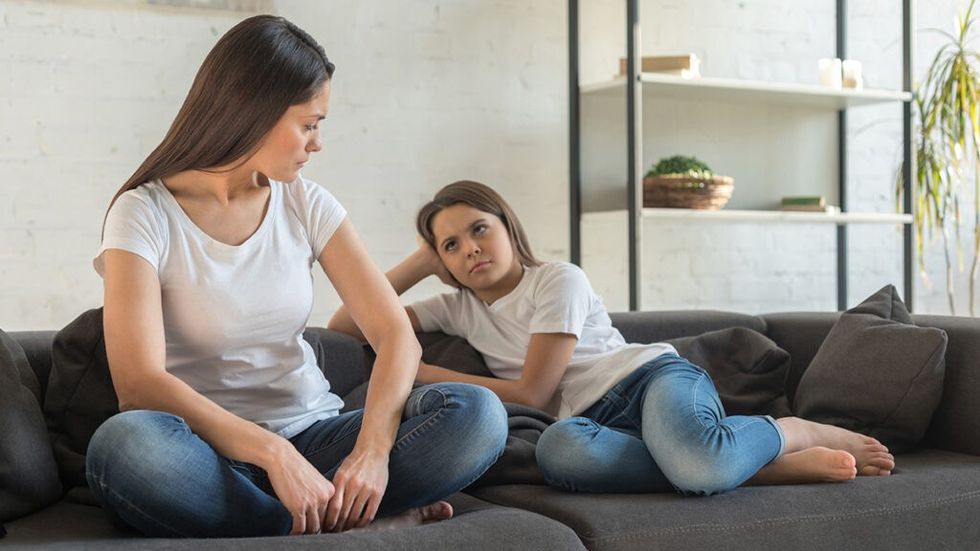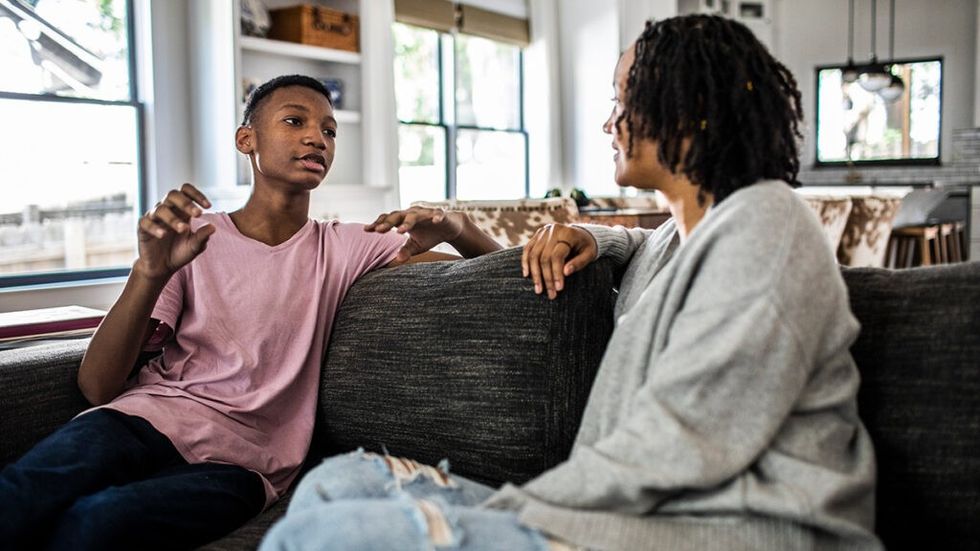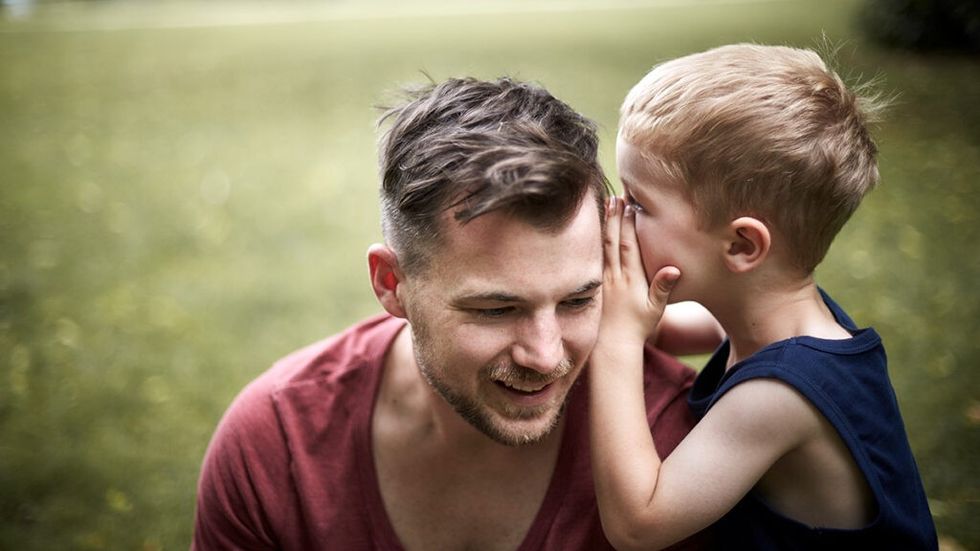How well do you know your partner? We don't just mean their favorite color or movie, but really know them. Beyond daily habits and favorite things, have you ever asked the deep questions? Or serious questions that truly matter? Their likes, dislikes, trauma, regrets, passions, dreams and greatest desires.
RELATED: Do the 36 Questions That Lead to Love Really Work?
These are not meant to undermine your relationship. An honest discussion will benefit you in many ways:
- Build deeper trust and understanding to get through not only the good times, but also the bad ones.
- It's a fun (even if it can get heavy sometimes) way to strengthen your bond.
- It allows you to be vulnerable and learn more about yourself.
- It encourages active and emphatic listening, which tends to reveal a lot about your partner's character and values.
- Overall, it's a great opportunity to learn more about your partner, their past, and visions for the future.
- Asking the right question at the right time can help us realize breakthroughs in many important areas of life, from finding out what we want to do with our life to improving personal relationships.
Communication will bring understanding and understanding will cause harmonious mutual relationships which can establish peace and stability.
– Lobsang Tenzin
The Power of Deep Questions in Every Relationship

RELATED: How Soon Is Too Soon to Move In? The 5 Most Important Questions to Answer
Understanding is the gateway to compassion and love, and questions allow us to obtain that necessary level of understanding, helping us learn why our partner behaves or thinks a certain way.
Looking for meaningful questions to deepen your relationship? Here are 101 conversation starters to help you and your partner connect on a more intimate level.
Couples Should Have Deeper Conversation about Life

1. What’s something you’re glad you’ll never have to do again?
When it comes to getting to know your partner on a more meaningful level, it really helps to build an understanding of any experiences they’d like to avoid — and why. Knowing the answers to these questions can be stress-relieving, or help to circumvent awkward situations, as well as cultivate empathy and a deeper understanding of their character.
2. What’s one thing you always procrastinate on?
3. What would you do with your life if you were suddenly awarded a billion dollars?
While winning a billion dollars is highly unlikely, anything is possible. What this question really reveals is more than their dream vacation, or how they would spend almost unlimited wealth. It reveals where your partner’s priorities lie when the usual obstacles and impediments are removed, and what their biggest dreams will be — the ones they’d like to pursue in their heart of hearts.
4. What should a healthy relationship provide for the people in it?
Relationship questions like this one are rather crucial to your expectations and theirs, and can be very helpful in determining whether your relationship needs and goals are aligned or not. If they’re not, you may find there is common ground enough to come together anyway — but knowing comes first.
5. Do you believe everything happens for a reason, or do we just find reasons after things happen?
6. Is there anything you consider absolutely unforgivable?
If your partner has a deal-breaker associated with unforgivable acts, it doesn’t hurt to know what it is so you can be sure that it doesn’t conflict with any of your unforgivable end zones. Plus, if you disagree on what’s forgivable, that’s worth discussing.
7. If you woke up tomorrow with no fear, what would you do first?
8. In your life, what has been the biggest blessing in disguise?
This is a great way to understand how your partner’s mind works — how they put things in perspective for themselves, and how they process ‘positive’ vs ‘negative’ forces in their lives.
9. If you could pick one year of your life to do-over, which would it be and why?
10. What is one behavior that you never tolerate?
Your partner may not tolerate clutter or messiness in their home, or they may not like the idea of having friends over late into the night. It's worth comparing and contrasting which behaviors you find acceptable and which you can’t stand. How else will you know if you’re well-aligned?
11. If you could write a note to your younger self, what would you say in only three words?
12. What is the one thing that makes you feel alive?
Whether it’s mountain climbing, skydiving, performing in front of an audience, traveling to new places, or simply being creative on a regular basis, it’s worth knowing what gets your partner’s juices flowing. Because arguably, feeling alive is everything!
13. What would your perfect day look like?
Not only can this question help you plan the perfect surprise birthday itinerary, but it can teach you a ton about how your partner likes to unwind and have fun — always useful information!
14. Do you usually follow your head or your heart when making decisions?
Contrary to surface-level understandings, "heart people" can be highly compatible with "head people," even helping to balance one another out, so don’t worry about their answer being different than yours, or being overly emotional compared to them. Also, don’t get stuck on black-or-white answers, as these things never are.
15. What is something that never ends well?
It prompts discussion about experiences or situations that consistently have negative outcomes. It can reveal patterns to avoid, and potentially add some humor about mistakes to avoid.
16. If you could change anything about the way you were raised, what would it be?
Romantic Questions: Thinking about Your Relationship

These are not just random questions to ask your boyfriend or partner. In real life, knowing how they want to spend date night, what the most attractive quality they find in others is, or what their favorite romantic movie is can seem like a silly thing to want to know at first.
RELATED: 3 Ways to Beat Relationship Boredom
However, they are also interesting questions that reveal much about compatibility, and the sort of romantic things and experiences they want in their lives.
1. What did you think when you first met me?
If you haven’t discussed your first impressions of one another, there’s really no time like the present. The answer to this question might be amusing; it might also be romantic. One thing's for sure, it’ll give you an insider's view on the path your partner traveled to choosing you.
2. What about our relationship makes you really happy?
Best case scenario: you gain a deeper understanding of what your partner appreciates about you, which can serve as a wonderful anchor in your relationship. Not to mention, regularly communicating what you appreciate about one another is the stuff of strong relationships.
3. If you had one word to describe our relationship what would it be?
4. What’s your biggest fear for this relationship?
Relationship anxiety is extraordinarily common, but there’s no antidote to this particular brand of fear like talking it through with an empathetic partner. Relationship fear is often based on past experiences, and once they’re out in the open, they have a greater chance of dissipating.
5. What’s one difference between us that you absolutely love?
They say opposites attract, and while this is certainly not always the case, having palpable differences is often a source of interest, intrigue and attraction between partners. Why not get some positive feedback on being yourself?
6. What’s one similarity between us that you absolutely love?
7. What about me (outside of a physical feature) made you fall in love?
If you’re in love, and the feeling is mutual, this is a question that can only feed your mutual affection and appreciation for one another — so don’t be afraid to ask.
8. What’s your favorite memory of us?
It's a reflective question that opens up emotional connection and at the same time helps you understand what your partner values most about your relationship.
9. What’s one thing you want to do together that we’ve never done before?
This question is perfectly suited to laying sprawled out in a field of flowers, visioning for the long-term with your significant other. It’s really healthy to want to share certain experiences (be it singing a duet at an open mic, entering a marathon, or buying real estate). And it’s even healthier to express it!
10. Where is your favorite place to be with me?
11. What’s one thing you’re scared to ask me, but really want to know the answer to?
These types of boyfriend questions are important: If your partner actually has an answer to this one, chances are you’ll want to ask the question. Better to get everything out in the open sooner than later. It may end up being an opportunity to hear the hardest truth, but one that strengthens the relationship over the long term.
12. What’s one thing you feel our relationship is lacking?
It's a constructive but honest question. Feel free to ask it only when you are both ready for feedback so you can identify unmet needs or areas for growth.
13. What’s your favorite non-physical quality about me?
Attraction is often based at least in part on physical traits, particularly at the beginning of a relationship. But if your relationship is a strong one, there is surely more to your bond than looks. Hearing all the other things that fuel your partner’s attraction can be really refreshing, enlightening, even.
14. If our relationship ended, what’s the one thing about it you’d miss the most?
15. What do you think was your most vulnerable moment in our relationship?
Staying honest (and therefore vulnerable) is integral to any successful relationship. What better way to achieve this than to talk about moments of authentic vulnerability without judgment?
16. What’s one secret you’ve wanted to tell me, but haven’t?
17. What’s your favorite way to receive affection?
Different people have different love languages, from physical touch, to words of affirmation, receiving gifts, quality time, and acts of service. There’s no better way to give and receive affection than by speaking each other’s language.
18. What’s one thing you think makes our relationship unique from everyone else’s?
19. If you could change one thing about our relationship what would it be?
It might seem counterintuitive to invite conversation based on the assumption that your partner would, in fact, change something about your relationship, but sometimes, it’s questions like these that make someone feel comfortable enough to raise an issue that's been on their mind.
20. What do you think is your biggest strength in this relationship?
21. What’s one thing about your life you would never change for someone else, including me?
While the tone of this question may seem a tad negative at first glance, identifying your partner’s non-negotiable traits, habits or attachments can go a long way toward helping you understand what’s most important to them in life.
22. What about us do you think works well together? How do we balance each other out?
23. What does love mean to you?
24. What do I mean to you?
This question is makes both parties vulnerable, so it's natural to want to shy away from it. But at a certain point in your relationship (you’ll know what point — it’s different for everyone), hot and heavy questions like this one are fair — and, hell, they can be extremely romantic too.
25. What was your first impression of me?
26. What’s the most romantic movie you’ve ever seen?
27. Do you believe in love at first sight?
Fun Questions to Ask Your Girlfriend, Boyfriend or Partner

Not everything has to be so serious! Sometimes the best relationship advice is to be silly and enjoy cute questions about crazy things.
RELATED: The 60 Best Secret Crush Quotes to Help You Thirst in Style
Funny questions can sometimes lead to a really good conversation that you guys will be really glad you had.
1. Given the choice of anyone in the world, whom would you want as a dinner guest?
2. Would you like to be famous? In what way?
3. If you were able to live to the age of 90 and retain either the mind or body of a 30-year-old for the last 60 years of your life, which would you choose?
Although questions like these have a bit of a party-trick vibe, they can also be very revealing of your partner’s core values. What does your partner value more: looks or lucidity? While answers should be taken with a grain of salt, you can learn lots from the inevitable explanations that accompany such answers.
4. Do you have a secret hunch about how you will die? (If their sense of humor is dark like yours)
5. If you could wake up tomorrow having gained one quality or ability, what would it be?
Many of us fantasize about possessing certain "superpowers" or abilities. This is a fun question to ask, but it can also teach you lots about your partner’s deepest wishes (be it to fly above it all, turn invisible on whim, or set fire to things spontaneously) — so ask, ask away!
6. If a crystal ball could tell you the truth about yourself, your life, the future or anything else, what would you want to know?
7. Is there something that you’ve dreamed of doing for a long time? Why haven’t you done it?
In the spirit of bringing the best out of one another, this question can help you plan a future in which you do just that. Why not encourage your partner to follow their dreams and talk through it with them if they get stuck?
8. If you knew that in one year you would die suddenly, would you change anything about the way you are now living? Why?
9. Share with your partner an embarrassing moment in your life.
Think of your most embarrassing moments as a treasure trove of a) good stories, b) hard lessons learned, and c) personal growth signposts. Sharing these with your partner will very likely bring you closer. After all, any partner worth their salt wants to know the real you — not the airbrushed version.
10. Your house, containing everything you own, catches fire. After saving your loved ones and pets, you have time to safely make a final dash to save any one item. What would it be? Why?
11. What’s your favorite karaoke song?
12. What is your go-to Halloween costume?
13. Who is your big celebrity crush?
Questions to Ask Your Partner about the Future

1. Where do you see yourself in five years?
If your partner hasn’t given any thought to this question, and you have (or vice versa), a discussion wouldn’t hurt. Sometimes all it takes is a little communication for two people to start creating five-year plans together.
2. How do you see our future together? Where do you see it headed?
It may seem daunting, but it’s important to have ‘the talk’ with your best friend and potential lifelong mate. If your hearts and paths are aligned, there shouldn’t be much in the way of surprises. If they're not, it’s still definitely worth knowing so you can reassess.
3. What are your goals in the relationship?
4. What are your thoughts on having a family?
This is not a peripheral question: if you want a big family but your partner would rather limit your dependents to cats and dogs, you need to have a discussion to determine whether there’s enough flexibility to move forward.
5. Where do you see yourself living when you retire?
6. What are your financial priorities and goals?
Money and love may seem antithetical, but the strongest relationships are transparent on all fronts. In other words, if you couldn’t care less about money or saving for the future, but your partner is steeped in mutual funds and RRSPs (or vice versa), it may be worth talking about to avoid future conflicts or imbalances in the relationship.
7. What is on your bucket list that we can do together this year?
8. What’s the one thing you want to achieve the most before you die?
If your partner has a goal to end all goals —something they don’t want to leave this earth without achieving (i.e. writing a novel, or opening a café) — you may want to consider getting behind it and supporting them. Because happier people make better partners!
9. Do you have any habits you want to change?
Be it quitting smoking and drinking, or curbing a bad temper, knowing your partner’s personal betterment aspirations can help you be a stronger support when they need it the most.
10. What do you most look forward to about getting old?
‘Getting old’ might not be a topic either of you naturally turn to, but talking about it can really help clarify your respective life trajectories (or at least the ones you see yourself following), as well as how your partner imagines life with you in the (distant) future.
11. What are you hoping to learn in the coming year?
12. What’s the best advice you’ve ever received in your whole life?
It reveals your partner's life wisdom and values, formative influences, or mentor relationships.
13. If you could see into the future, what’s one thing you want to see?
Many of us would rather not look into the future and find out things that might rob us of quality of life in the present moment. Then again, your partner may have good reasons to prefer knowing how certain life aspects will unfold. You should probably hear this.
14. How do you want to be remembered?
Questions to Ask Your Husband, Wife or Partner about Their Past

1. When’s the last time you felt vulnerable? How did you cope?
2. What have you accomplished in the past year that you are most proud of?
Close as you feel to your partner, you may not actually be aware of how they judge their own achievements and what it is they take real pride in. True intimacy requires learning more about your partner’s inner world when the opportunity presents itself.
3. What were the major turning points in your life?
From past trauma dating back to one's childhood, to struggles with anxiety, depression, or addiction your partner may have dealt with before knowing you, ‘turning points’ come in many forms. Learning your partner means knowing their history.
4. When’s the last time you pushed out of your comfort zone? How did it make you feel?
5. What is your happiest memory?
Sharing the happiest memories of our lives is a beautiful way of getting closer to our partners while opening the door to creating new happy memories together as a couple.
6. How have you changed in the past five years?
7. When was the last time you cried and why?
Some people cry often, and others rarely. We all have different relationships to shedding tears, and understanding your partner’s will only shed light on their emotional reality. Bonus: asking the question entails sharing a vulnerable moment, and vulnerability breeds intimacy.
8. What is an important life lesson you’ve learned?
9. What’s the most daring thing you’ve ever done?
We don’t all have the same notions of courage, or of boldness. You can learn volumes about your partner by hearing them tell of the most daring thing they ever did, and the kind of results it manifested in their life.
10. What is the biggest lesson you’ve learned from past partners?
Not everyone likes to discuss their previous relationships with their current partner, and indeed, there should be a limit to such discussions. But that doesn’t mean there aren’t valuable lessons to be shared. Chances are that learning about your partner’s experiences in previous serious relationships will help you to better understand their behaviors today.
11. What’s the most challenging setback you’ve ever experienced? How did you overcome it?
12. If you could change one thing in history, what would it be?
13. What’s the best gift you’ve ever received?
14. If you had to listen to just one of the songs you loved as a kid for the rest of your life, which song would it be?
15. Did you have any pets growing up?
Particularly if animals are important to you, and/or you plan on having pets in the future, it’s integral you get to know your partner’s attitude toward animals.
16. What is your favorite childhood memory?
Heavy Questions to Ask Your Girlfriend, Boyfriend or Partner

1. Do you want to have kids? If so, how many?
2. When you’re having a bad day, what makes you feel better?
This is the kind of question that helps you better understand how to comfort your girlfriend when she's down and just needs a reprieve from life for a minute (or a day). Whether it’s cooking a meal, cleaning the apartment, or giving her a temple massage, these are important life skills, so never underestimate them!
3. Do you consider yourself a jealous person?
4. Have you ever cheated on a partner?
If your girlfriend has cheated in the past, it’s worth knowing, just as it's worth knowing what led her to it, and how she feels about it in retrospect. People grow and change — they do it all the time.
5. Why did your last relationship end?
6. How important is religion or spirituality in your life?
Religion and/or spirituality may or may not play a significant role in your life — either way, unless the topic was at the forefront of your first meeting, your partner might have an altogether different relationship to faith. If you want to build a future together, don’t hesitate to ask her. If she’s worth being in a relationship with, she’s worth really knowing.
7. Who was your role model growing up?
8. Have you ever been in an emotional or physically abusive relationship?
If your partner has coped with an abuser in the past (be it an ex-partner, a parent, or anyone else) getting closer to your girlfriend likely means learning what she’s been through — to whatever extent she’s willing to share.
9. How important are looks to you?
10. Do you think a relationship can come back from cheating?
In a committed, monogamous relationship, no one wants a partner who strays. That said, your boyfriend might take cheating less seriously than you do — or vice versa. Put your mind at ease by addressing concerns as they arise, and with total transparency.
11. How long was your longest relationship?
12. How do you see our future together: do you envision a two-income household, or a different arrangement?
Whether you envision yourself as a blissfully content stay-at-home-mom, a high octane corporate executive — or both — finding out what kind of household arrangement your boyfriend imagines for his future (i.e., blissfully content stay-at-home dad) can help circumvent a lot of potential conflict in the future.
13. Have you ever struggled with addiction?
While it’s true that our struggles do not define us, your boyfriend’s history with any sort of addiction is something you’re within your rights to ask about, as it may affect you too. Even if this does not represent his current reality, understanding his past struggles can help you become a lot better acquainted with the man you’re sharing your life with.
14. Have you ever been engaged or married?
Becoming acquainted with the broad strokes of your boyfriend’s past romantic life can help you better understand his behaviors, interests, and hesitations in your current relationship.
15. Are you an introvert or an extrovert?
You might have a very different style of communicating or relating to others than your boyfriend does. This doesn’t make you incompatible—in fact, it might even make you extra complementary. Still, it helps to address these differences so you can better understand and empathize with one another, while also being supportive of your partner even if you can’t directly relate to their difficulties.
Why Are Questions in Relationships So Important?

Ultimately, when it comes to building and maintaining strong relationships, communication is both king and queen! The more deeply you open up to truly getting to know one another, the sturdier your foundation will be.
Nothing can shake you if your version of intimacy includes sharing your best and worst moments with compassion, acceptance, and love. Asking questions (and answering them) without reservation is a surefire way to open up the floodgates of vulnerability—by extension cultivating deeper shared emotional experiences.
With additions by MJ Kelly and Maya Khamala



























 Photo by
Photo by  Photo by
Photo by  Photo by
Photo by 











